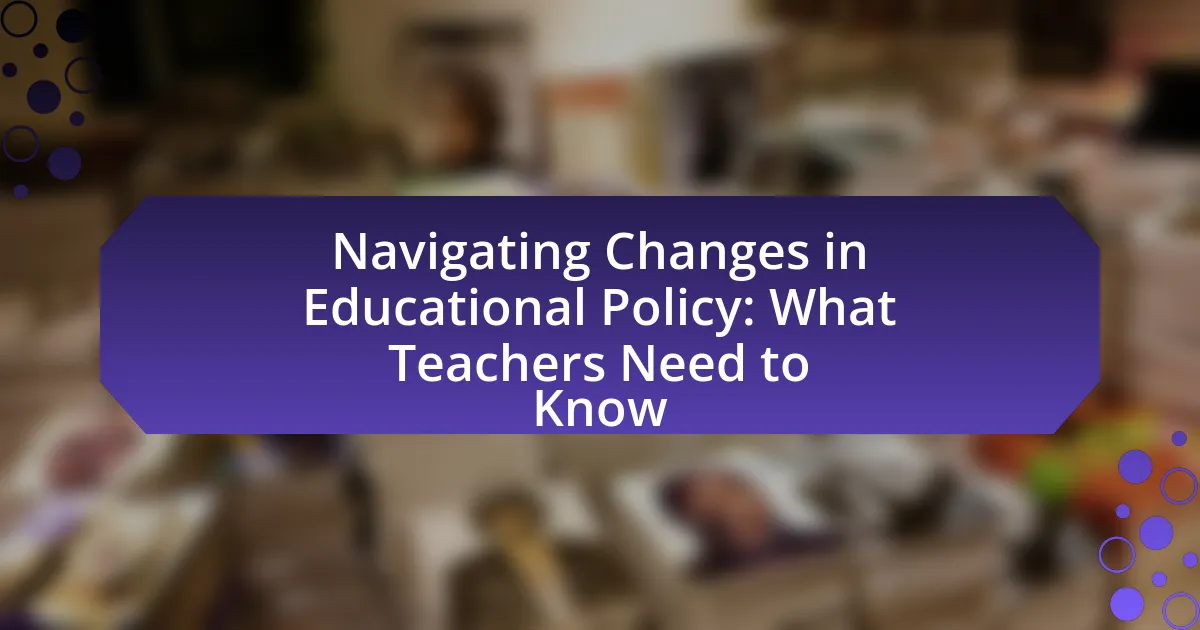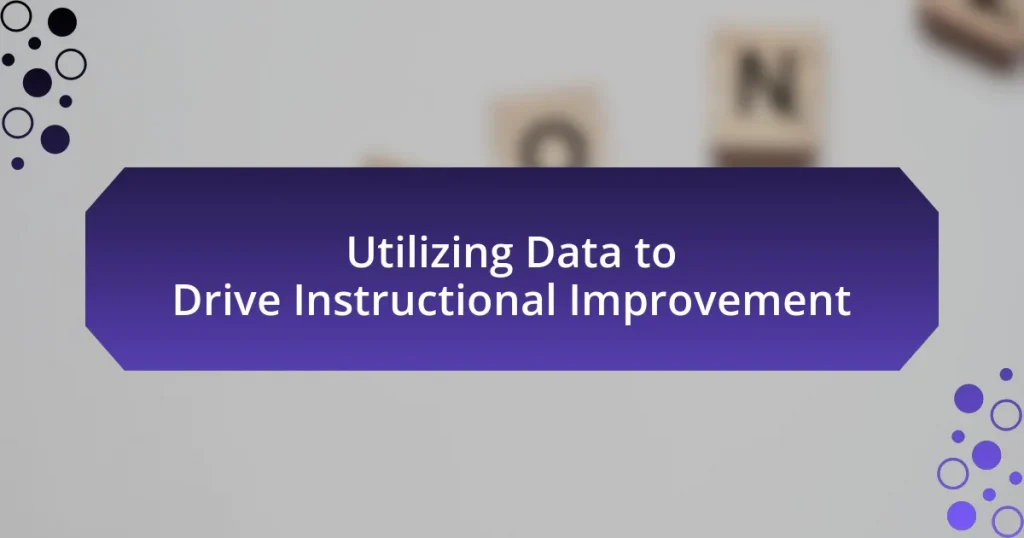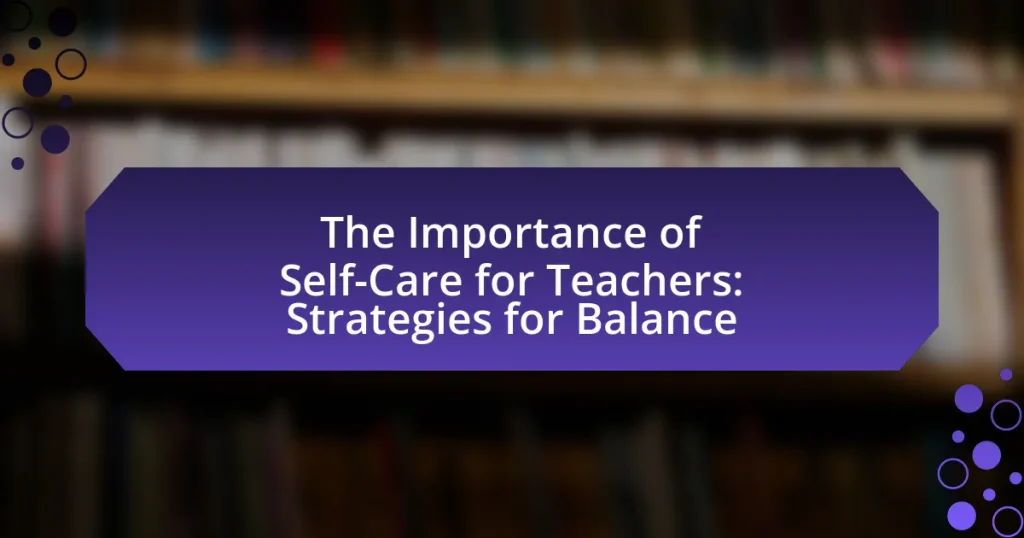The article focuses on the key changes in educational policy that teachers need to be aware of, including the emphasis on social-emotional learning, technology integration, and competency-based education. It outlines how these changes impact classroom practices, assessment methods, and the overall educational environment. Specific recent policies, such as increased funding for mental health services and new remote learning standards, are discussed, along with their implications for student outcomes and equity in education. The article emphasizes the importance of teachers staying informed about these changes to adapt their teaching strategies effectively and advocate for equitable practices. Additionally, it provides practical steps for teachers to navigate these policy shifts and enhance their professional development.
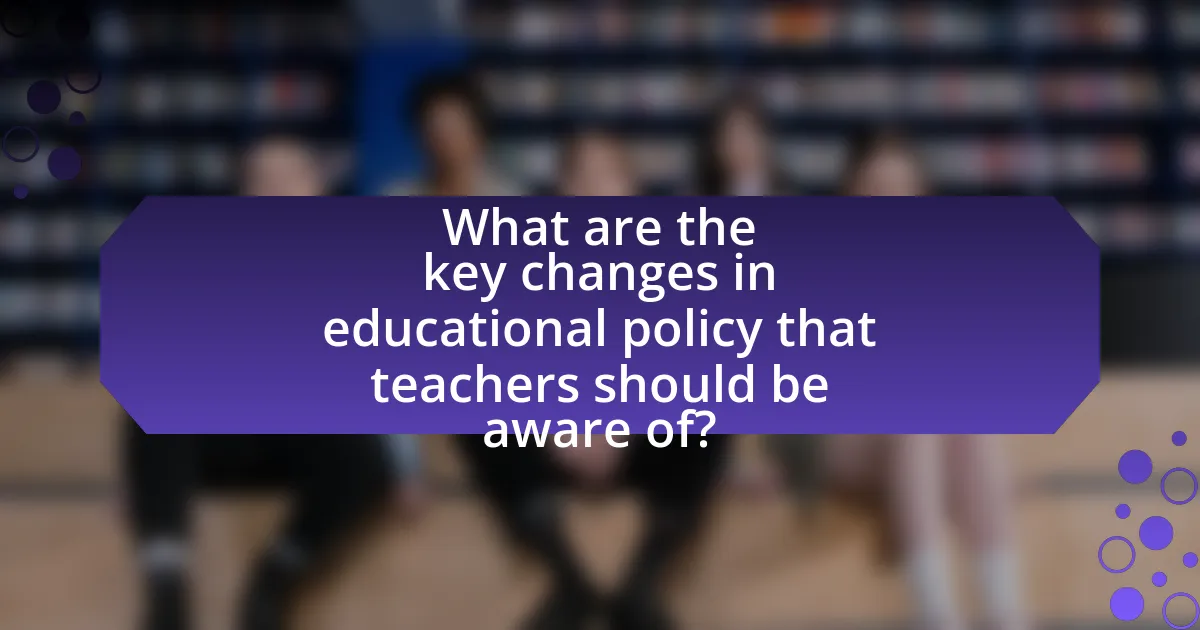
What are the key changes in educational policy that teachers should be aware of?
Key changes in educational policy that teachers should be aware of include the increased emphasis on social-emotional learning (SEL), the integration of technology in the classroom, and the shift towards competency-based education. Social-emotional learning initiatives are being adopted to support students’ mental health and well-being, with research indicating that SEL can improve academic performance and reduce behavioral issues. The integration of technology is being prioritized to enhance learning experiences, as evidenced by the rise in funding for digital resources and training for teachers. Competency-based education focuses on students mastering skills at their own pace, which aligns with the growing demand for personalized learning approaches. These changes reflect a broader trend towards holistic education that addresses both academic and emotional needs.
How do these changes impact classroom practices?
Changes in educational policy significantly impact classroom practices by altering curriculum standards, assessment methods, and teaching strategies. For instance, the introduction of new state standards often requires teachers to adapt their lesson plans to meet these expectations, which can lead to a shift in instructional focus. Research indicates that when states implement higher academic standards, teachers report needing to adjust their teaching methods to ensure students are adequately prepared for assessments aligned with these standards. This adaptation can include integrating more technology into lessons or emphasizing critical thinking skills over rote memorization. Furthermore, changes in assessment policies, such as the move towards formative assessments, encourage teachers to adopt more collaborative and student-centered approaches, fostering an environment that prioritizes ongoing feedback and personalized learning.
What specific policies have been implemented recently?
Recently, several specific educational policies have been implemented, including the expansion of funding for mental health services in schools and the introduction of new standards for remote learning. The funding increase aims to address the growing mental health needs of students, with a reported 20% rise in mental health issues among youth according to the National Institute of Mental Health. The new remote learning standards, established by the Department of Education, focus on ensuring equitable access to technology and high-quality instructional materials, responding to the challenges faced during the COVID-19 pandemic.
How do these policies affect student assessment methods?
Educational policies significantly influence student assessment methods by mandating standardized testing and performance-based evaluations. These policies often require schools to adopt specific assessment frameworks that align with state or national standards, thereby shifting the focus from traditional grading systems to more comprehensive evaluation techniques. For instance, the implementation of the Every Student Succeeds Act (ESSA) emphasizes the use of multiple measures for assessing student performance, which includes formative assessments, project-based learning, and portfolios. This shift aims to provide a more holistic view of student learning and progress, ensuring that assessments are not solely reliant on high-stakes testing.
Why is it important for teachers to stay informed about educational policy changes?
It is important for teachers to stay informed about educational policy changes because these policies directly impact their teaching practices, student outcomes, and overall school environment. When teachers are aware of policy updates, they can adapt their instructional strategies to align with new standards and regulations, ensuring compliance and enhancing educational effectiveness. For instance, the Every Student Succeeds Act (ESSA) emphasizes accountability and equity, requiring teachers to implement evidence-based practices that support diverse learners. By staying informed, teachers can also advocate for their students’ needs and contribute to discussions on policy development, ultimately fostering a more effective educational system.
What are the potential consequences of not adapting to policy changes?
Not adapting to policy changes can lead to significant negative consequences for educational institutions and educators. These consequences include decreased funding, as many educational grants and resources are contingent upon compliance with updated policies. Additionally, failure to adapt can result in legal repercussions, including lawsuits or penalties for non-compliance with federal or state regulations. Furthermore, educators may experience diminished job security and professional credibility, as their inability to align with current standards can undermine their effectiveness and reputation. Research indicates that schools that do not implement policy changes effectively may see a decline in student performance and engagement, ultimately impacting overall educational outcomes.
How can staying informed benefit teachers’ professional development?
Staying informed benefits teachers’ professional development by enhancing their knowledge of current educational policies and practices. This awareness allows teachers to adapt their teaching strategies to align with new standards and regulations, ultimately improving student outcomes. Research indicates that teachers who engage in continuous learning and stay updated on educational trends are more effective in their roles, as they can implement evidence-based practices and foster a dynamic learning environment. For instance, a study by the National Center for Education Statistics found that professional development linked to current educational policies significantly correlates with improved teacher performance and student achievement.
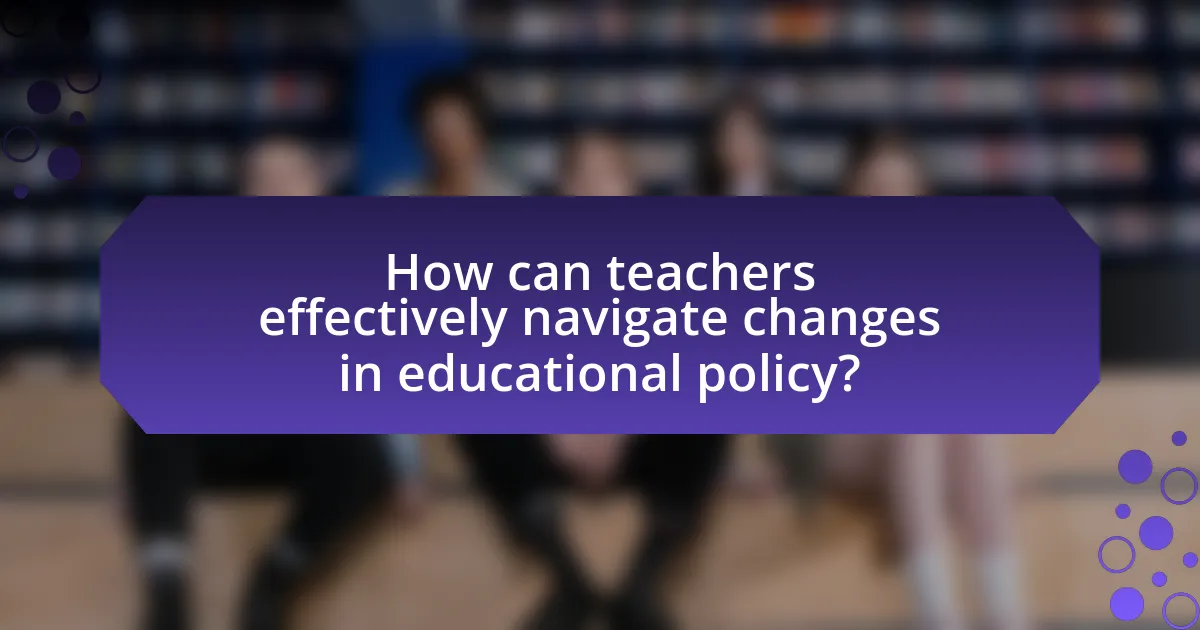
How can teachers effectively navigate changes in educational policy?
Teachers can effectively navigate changes in educational policy by staying informed, engaging in professional development, and collaborating with colleagues. Staying informed involves regularly reviewing policy updates from educational authorities and participating in relevant workshops or seminars. Engaging in professional development allows teachers to adapt their teaching strategies to align with new policies, enhancing their effectiveness in the classroom. Collaboration with colleagues fosters a supportive environment where teachers can share insights and strategies for implementing changes, ultimately leading to a more cohesive approach to policy adaptation. These methods are supported by research indicating that informed and collaborative educators are better equipped to implement policy changes successfully.
What strategies can teachers use to adapt to new policies?
Teachers can adapt to new policies by engaging in continuous professional development and collaborating with colleagues. Continuous professional development allows teachers to stay informed about policy changes and best practices, enhancing their instructional strategies. Collaboration with colleagues fosters a supportive environment where teachers can share insights and resources, facilitating a smoother transition to new policies. Research indicates that schools with strong collaborative cultures experience higher levels of teacher efficacy and student achievement, demonstrating the effectiveness of these strategies in adapting to policy changes.
How can collaboration with colleagues enhance understanding of policy changes?
Collaboration with colleagues enhances understanding of policy changes by facilitating the sharing of diverse perspectives and expertise. When educators work together, they can discuss the implications of new policies, clarify uncertainties, and collectively analyze how these changes affect their teaching practices. Research indicates that collaborative professional development leads to improved comprehension of educational policies, as teachers engage in dialogue that deepens their insights and fosters a supportive learning environment. For instance, a study by Vescio, Ross, and Adams (2008) published in the “Journal of Educational Change” found that collaborative practices among teachers significantly improved their understanding and implementation of policy changes, ultimately benefiting student outcomes.
What resources are available for teachers to learn about policy updates?
Teachers can access various resources to learn about policy updates, including official government education websites, professional organizations, and educational journals. Government websites, such as the U.S. Department of Education, provide the latest policy changes and guidelines. Professional organizations like the National Education Association offer newsletters and webinars focused on policy updates. Additionally, educational journals often publish articles analyzing recent policy changes and their implications for teaching practices. These resources ensure that teachers stay informed about the evolving educational landscape.
What role do professional organizations play in supporting teachers?
Professional organizations play a crucial role in supporting teachers by providing resources, advocacy, and professional development opportunities. These organizations offer teachers access to research-based practices, networking opportunities, and platforms for sharing best practices, which enhance their teaching effectiveness. For example, the National Education Association (NEA) and the American Federation of Teachers (AFT) advocate for teachers’ rights and influence educational policy at local, state, and national levels, ensuring that teachers’ voices are heard in legislative discussions. Additionally, these organizations often provide workshops, conferences, and online resources that help teachers stay updated on educational trends and policies, thereby equipping them to navigate changes in educational policy effectively.
How can joining a professional organization help teachers stay updated?
Joining a professional organization helps teachers stay updated by providing access to the latest research, resources, and networking opportunities within the education field. These organizations often host conferences, workshops, and webinars that focus on current educational trends and policy changes, enabling teachers to enhance their knowledge and skills. For instance, the National Education Association (NEA) offers resources that keep educators informed about legislative developments and best practices in teaching. Additionally, membership often includes subscriptions to journals and newsletters that disseminate timely information relevant to educators, ensuring they remain informed about advancements and shifts in educational policy.
What types of training and workshops do these organizations offer?
Organizations focused on educational policy changes offer various training and workshops, including professional development sessions, curriculum design workshops, and policy analysis training. These programs aim to equip educators with the necessary skills to adapt to new regulations and improve teaching practices. For instance, professional development sessions often cover the latest educational standards and assessment strategies, while curriculum design workshops help teachers align their lesson plans with updated policies. Additionally, policy analysis training enables educators to critically evaluate and implement changes in educational legislation effectively.
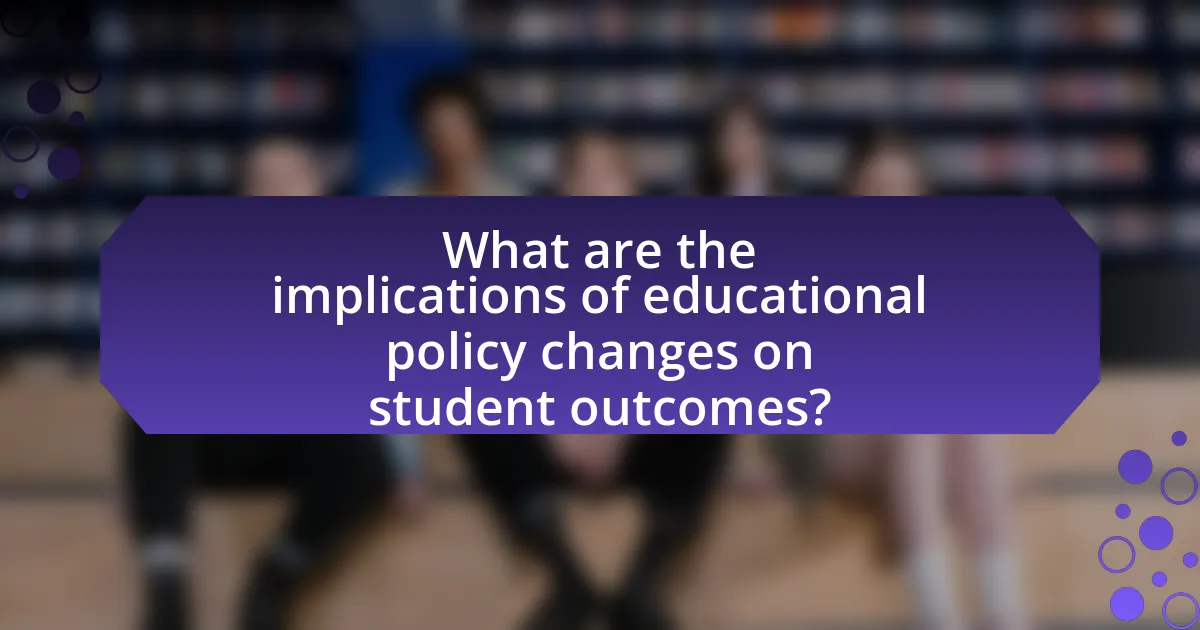
What are the implications of educational policy changes on student outcomes?
Educational policy changes significantly impact student outcomes by altering the educational environment, resources, and teaching methodologies. For instance, the implementation of the Every Student Succeeds Act (ESSA) in the United States shifted accountability measures from federal to state control, allowing for more localized decision-making. This change has led to varied educational practices across states, which can either enhance or hinder student performance based on the effectiveness of the policies adopted. Research indicates that states that adopted more rigorous standards and assessments saw improvements in student achievement, as evidenced by the National Assessment of Educational Progress (NAEP) scores, which showed gains in mathematics and reading among fourth and eighth graders following such reforms. Therefore, the implications of educational policy changes are profound, influencing not only academic performance but also equity in educational access and quality.
How do policy changes influence equity in education?
Policy changes significantly influence equity in education by altering funding allocations, resource distribution, and access to quality educational opportunities. For instance, the implementation of policies such as the Every Student Succeeds Act (ESSA) in the United States aimed to provide more equitable funding to under-resourced schools, thereby addressing disparities in educational outcomes. Research indicates that equitable funding can lead to improved student performance, particularly in low-income areas, as evidenced by studies showing that increased investment in education correlates with higher graduation rates and test scores among disadvantaged populations. Thus, policy changes that prioritize equity can create a more level playing field in education.
What measures are being taken to ensure all students benefit from policy changes?
Measures being taken to ensure all students benefit from policy changes include the implementation of inclusive educational practices and targeted support programs. Educational institutions are adopting frameworks that promote equity, such as differentiated instruction and universal design for learning, which cater to diverse learning needs. Additionally, data-driven assessments are being utilized to identify gaps in student performance, allowing for tailored interventions. Research indicates that schools employing these strategies have seen improved outcomes for underrepresented student populations, demonstrating the effectiveness of these measures in fostering an equitable learning environment.
How can teachers advocate for equitable practices in response to policy changes?
Teachers can advocate for equitable practices in response to policy changes by actively participating in policy discussions and collaborating with stakeholders. Engaging in professional development focused on equity allows teachers to understand the implications of policy changes and how they affect diverse student populations. Research indicates that teachers who form coalitions with parents, community organizations, and educational leaders can effectively influence policy by presenting data on student outcomes and advocating for resources that support equitable practices. For instance, the National Education Association emphasizes the importance of teacher voices in shaping policies that address disparities in education, highlighting that informed advocacy can lead to more inclusive and fair educational environments.
What best practices should teachers adopt in light of these changes?
Teachers should adopt a flexible and adaptive teaching approach in light of changes in educational policy. This involves regularly updating their curriculum to align with new standards and integrating technology to enhance learning experiences. Research indicates that teachers who engage in continuous professional development are better equipped to implement policy changes effectively, leading to improved student outcomes. For instance, a study by the National Center for Education Statistics found that teachers who participated in ongoing training were 30% more likely to successfully adapt their teaching methods to meet new educational standards.
How can teachers implement new assessment strategies effectively?
Teachers can implement new assessment strategies effectively by integrating formative assessments into their teaching practices. Formative assessments, such as quizzes, peer reviews, and classroom discussions, provide ongoing feedback that helps educators adjust their instruction to meet student needs. Research indicates that formative assessments can lead to a 25% increase in student achievement when used regularly (Black & Wiliam, 1998). By utilizing these strategies, teachers can create a responsive learning environment that fosters student engagement and improves learning outcomes.
What are some tips for communicating policy changes to students and parents?
To effectively communicate policy changes to students and parents, educators should utilize clear and concise messaging. This involves outlining the specific changes, the reasons behind them, and how they will impact students. Providing multiple channels for communication, such as emails, newsletters, and meetings, ensures that the information reaches all stakeholders. Additionally, offering opportunities for questions and feedback fosters engagement and understanding. Research indicates that transparent communication can enhance trust and cooperation among parents and schools, leading to better educational outcomes.
What practical steps can teachers take to stay proactive in their response to policy changes?
Teachers can stay proactive in their response to policy changes by regularly engaging in professional development and staying informed about legislative updates. By participating in workshops, webinars, and conferences, educators can gain insights into new policies and best practices. Additionally, subscribing to educational journals and following relevant organizations on social media can provide timely information on policy shifts. Collaborating with colleagues to discuss implications of policy changes fosters a supportive environment for adapting teaching strategies. Furthermore, advocating for their needs and perspectives through participation in school committees or local education boards allows teachers to influence policy discussions directly. These steps ensure that educators remain knowledgeable and prepared to implement necessary changes effectively.
